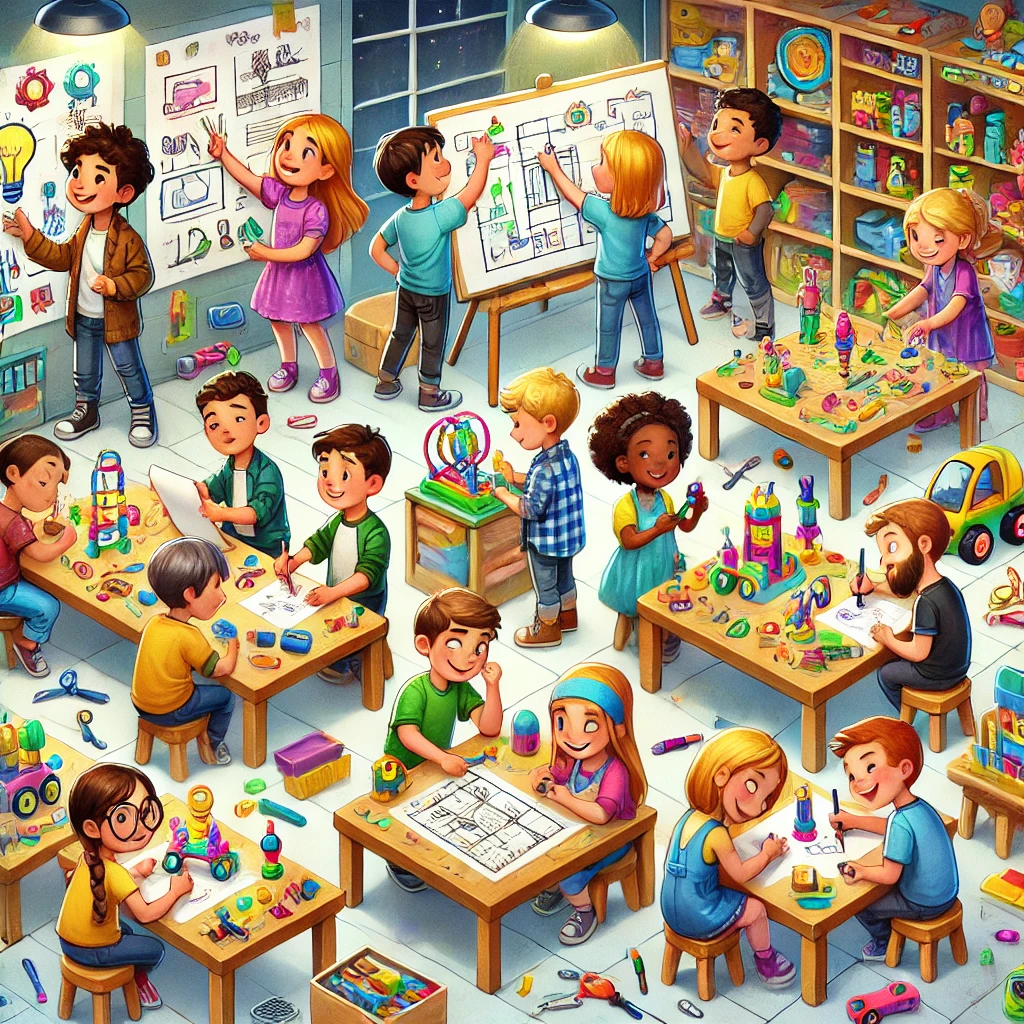
Staff Member #1
Biography of instructor/staff member #1

Imagine walking into a toy store where every single toy was designed by kids—just like you! What if you could create a brand-new toy, not just for yourself, but for a friend? A toy that brings joy, helps someone learn, or even makes the world a little better? In this course, you will become a toy designer, just like the professionals who create your favorite games, dolls, puzzles, and action figures. But great toy designers don’t just think about what they want—they think about who will play with their toy and what will make it fun, safe, and special for them!
To create the best toy possible, you’ll start by learning about your "customer"—a real friend, classmate, or family member. What do they like? What makes them smile? What kind of toy would they love? You’ll use human-centered design, which means putting yourself in someone else’s shoes and designing with their needs in mind. By sketching, building, and testing your ideas, you’ll bring your toy to life step by step.
Along the way, you’ll also start thinking like an entrepreneur—someone who creates things that people need and love! You’ll ask big questions like: Who would love my toy? Where would I sell it? How can I make it stand out? You'll gather feedback from real users—your classmates, younger students, and even family members—to make your design even better.
At the end of the course, you’ll showcase your final toy design and present it—just like real inventors do in the real world!
Get ready to play, create, and invent in the ultimate Toy Makers’ Challenge—where the best toy isn’t just fun, but made for someone special!
Basic Speaking & Listening Skills: Students should be comfortable participating in simple conversations and following oral instructions.
Emerging Reading & Writing Abilities: A foundational level of reading (even if still developing) and the ability to write or dictate short sentences.
Willingness to Express Ideas: Openness to sharing thoughts verbally or through drawings, short written sentences, or simple recordings.
Curiosity & Imagination: An eagerness to observe the world, ask questions, and explore creative ways to solve problems.
Adult Support: Guidance is needed for uploading work (photos, videos, audio), navigating online tools, and providing constructive feedback.
Basic Digital Navigation: Familiarity with simple tech tasks like using a touchscreen or clicking a mouse to play videos or join virtual calls (with adult help as needed).
These core skills help ensure young learners can fully participate in the interactive and creative aspects of the course.

Biography of instructor/staff member #1

Biography of instructor/staff member #2
1. What age group is this course designed for?
This course is created for children in Kindergrden through to Grade 2 (approximately ages 5- 8).
2. Does my child need advanced reading or writing skills?
No. We welcome all reading and writing levels. Children can share their ideas through drawings, short sentences, or recorded audio/videos. Light adult support may be helpful for younger or emerging readers.
3. How much time will this course take each week?
The total recommended time is about 1–2 hours weekly, which includes watching short videos, doing hands-on activities, and participating in a group discussion or Zoom call. This can be broken into smaller segments based on the child’s attention span.
4. Do I need special technology or software for my child to participate?
You’ll need a reliable internet connection, a device to watch videos and access the discussion forums (computer or tablet), and a way to record or upload your child’s responses (a webcam, smartphone, or tablet camera). No additional paid software is required.
5. How will my child interact with classmates and the teacher?
Children will post their work (text, drawings, short videos) in an online discussion forum. They can also comment on classmates’ posts. There are two live sessions a week. One is for structured discussions and the other is shaped around tasks and activities that introduce your child to Entrepreneurship concepts.
6. What kind of support should I provide as a parent or guardian?
Parents can assist with basic tasks such as uploading photos or videos, helping with reading prompts, and encouraging the child to articulate ideas. An adult presence is also recommended during live Zoom sessions to ensure a safe, positive experience.
7. Is there homework or graded assignments?
The course focuses on creativity and expression rather than grades. Students will complete weekly activities and submit their work, but feedback is largely encouraging and skill-building oriented. There’s no formal grading scale.
8. What if my child is shy and doesn’t like speaking in front of others?
We encourage children to participate in a way that feels comfortable—this could be drawings, short written pieces, or recorded audio/video if speaking live feels too intimidating at first. Over time, we’ll gently help them build confidence.
9. Will my child learn practical skills beyond Entrepreneurship?
Yes! They’ll also practice critical thinking, empathy (understanding others’ perspectives), and basic public speaking. These are foundational skills that can be applied to many areas of life and learning.